Child-Free Woman Refuses To Childproof Her House For Family Thanksgiving, Siblings Call Her An AH
When parents are expecting a baby, they tend to childproof their houses. A childproofed home provides a safe spot for a baby to play and explore, which also helps to avoid accidents.
Childproofing your home is one of the best methods to help prevent injuries to your infant. You can do this by going through your house room by room, looking for potential hazards, and then buying and installing the necessary items on your own.
If you have a limited amount of time and lack the necessary tools or knowledge, hiring a professional childproofing service may be your best option. So what if there's no need to childproof your home?
Meet u/HelpEducational8357, who recently moved into her own home. She doesn’t have kids, so there's no need to childproof her house.
The OP's family has been pushing for her to host Thanksgiving at her house, as it’s the biggest gathering. The OP has five siblings, each with their own kids (between 2 and 4 each), and it’s a lot of people when you add her parents, aunts, uncles, etc.
So the OP made some rules that everyone would have to follow if they wanted Thanksgiving at her place, but her siblings still wanted her to childproof her house, which she wasn't willing to do. Read the entire story in the OP's own words below.
The OP Writes

The OP turned her top floor into parrot space where they have a massive room to fly freely

Here are the laid down rules
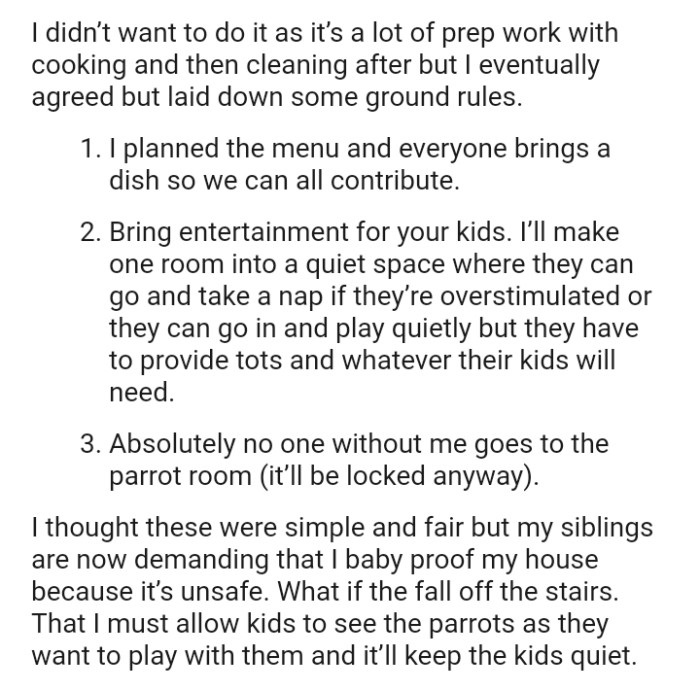
Child-Free Choices and Family Dynamics
Dr. Jennifer Smith, a family psychologist at the University of Virginia, explains that choosing to remain child-free can often lead to misunderstandings with family members who may have different expectations. This choice is deeply personal and often based on various factors, including lifestyle preferences and financial considerations.
Research shows that societal norms can pressure individuals into traditional roles, leading to feelings of guilt or inadequacy when those roles are not embraced.
Child-Free Choices and Family Dynamics
The decision to remain child-free can often lead to significant tension within family dynamics, especially during gatherings such as Thanksgiving. A sociologist from UC Berkeley notes that societal expectations around parenthood can create pressure for individuals who choose differently.
Studies indicate that these pressures can lead to feelings of alienation and conflict within family relationships, particularly when boundaries are not respected.
There was absolutely no way that the OP would allow kids inside the parrot room
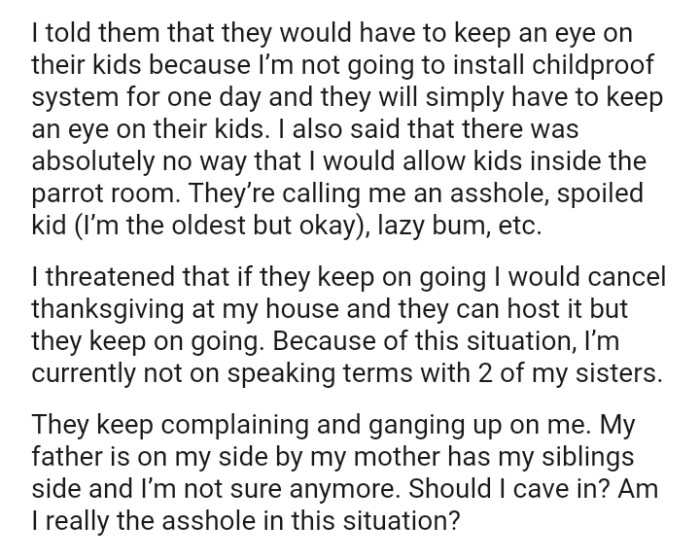
The Reddit thread got over a thousand comments and here are some of them

They are responsible for minding their children

According to Dr. Alexandra Solomon, a relationship therapist, "When family members do not respect a person's decision to remain child-free, it can create significant tension and emotional distress." This sentiment is echoed by James Clear, author and habits expert, who states, "Differing values and life choices can lead to misunderstandings that affect family dynamics." Understanding these complexities is essential for fostering healthier family relationships.
In this case, the child's presence at family gatherings highlights the importance of setting boundaries that align with personal values. According to research in family psychology, clearly defined boundaries are crucial for maintaining healthy relationships and preventing resentment.
When individuals feel their boundaries are encroached upon, it can lead to heightened stress and conflict, as seen in this scenario.
Having it at one of the baby-proofed houses

Making new memories in my new home

A bubble-wrapped petting zoo got the entertainment of their kids
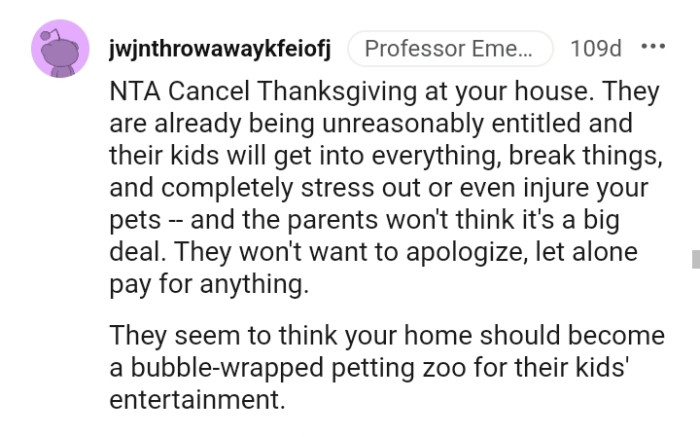
The Psychology of Boundaries
Setting boundaries is essential for maintaining emotional health, especially when family expectations conflict with personal values. Dr. Brené Brown emphasizes that healthy boundaries are crucial for self-respect and protecting one's emotional well-being.
Her research highlights that honoring one’s choices can lead to more fulfilling relationships, as it encourages respect and understanding.
Managing Familial Expectations
Familial expectations can weigh heavily on individuals, particularly regarding choices around parenthood. A psychologist at the University of Michigan explains that these expectations often stem from cultural narratives that equate success with parenthood.
Research shows that navigating these expectations requires clear communication and self-advocacy to maintain personal integrity and satisfaction.
Getting a high-fenced baby-proof

The parrots will certainly enjoy the Bahamas

You have taken reasonable steps
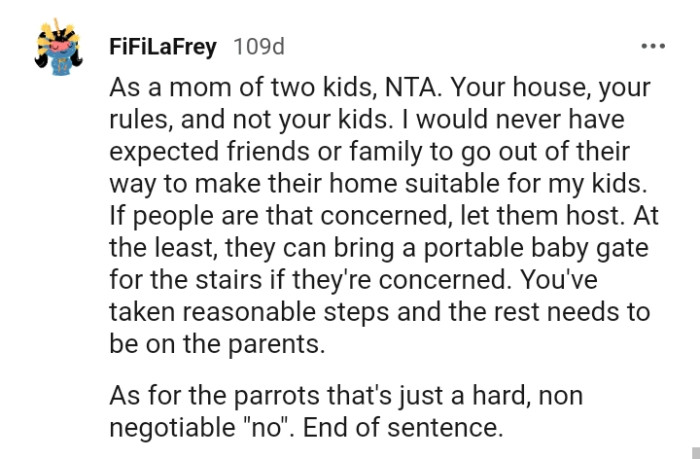
To navigate tensions around family gatherings, individuals should consider setting clear boundaries about their choices and communicating them effectively. Strategies like assertive communication can help express personal preferences without escalating conflicts.
Research indicates that utilizing 'I' statements, such as 'I feel' or 'I prefer,' can foster constructive dialogue and reduce defensiveness.
To address familial pressures, individuals can benefit from practicing assertiveness and engaging in open dialogues about their choices. Techniques such as using 'I' statements can help express feelings without eliciting defensiveness from family members.
Establishing boundaries around personal choices can also create a more respectful family environment, fostering understanding and acceptance.
No one should be expected to baby-proof their house

This Redditor is suggesting for the OP not to host Thanksgiving

This sounds like a disaster waiting to happen

Coping with Family Pressure
Coping with family pressure requires developing resilience and self-advocacy skills. Dr. Steven Hayes, a psychologist known for his work on Acceptance and Commitment Therapy (ACT), suggests that individuals should focus on their values and act in alignment with them, even when faced with external pressures.
This approach can help individuals maintain their sense of self while navigating challenging family dynamics.
The Importance of Self-Advocacy
Self-advocacy is essential for maintaining personal boundaries and ensuring that individual choices are respected. A clinical psychologist notes that asserting one's needs can lead to healthier relationships and reduce feelings of resentment.
Research indicates that individuals who effectively advocate for themselves experience greater satisfaction in their relationships and overall well-being.
The kids can still pound on it and wail

They can host it at a childproof house
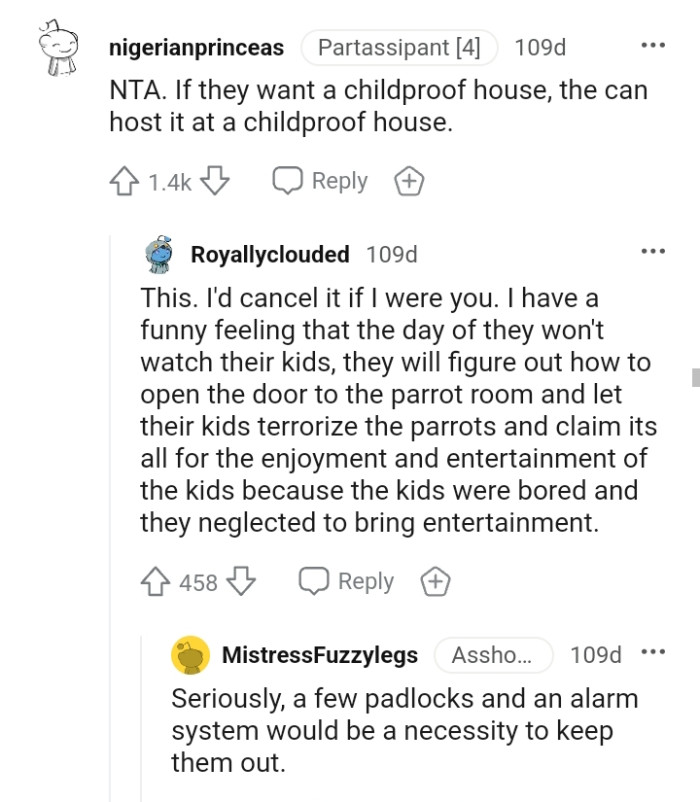
That is a huge red flag already

Encouraging open discussions about family expectations can help individuals feel more supported in their choices. Techniques such as family meetings or mediation can provide a platform for expressing feelings and negotiating boundaries.
Research shows that fostering an environment of mutual respect can enhance family bonds, even in the face of disagreement.
To enhance self-advocacy skills, individuals can engage in role-playing exercises to practice articulating their needs. Seeking support from like-minded individuals or groups can also provide encouragement and validation, reinforcing confidence in asserting personal choices.
Ultimately, cultivating self-advocacy is vital for navigating familial dynamics and preserving one’s values.
How about not allowing the kids up the stairs?

Your nephews are not your responsibility

Your rules about your home are your rules
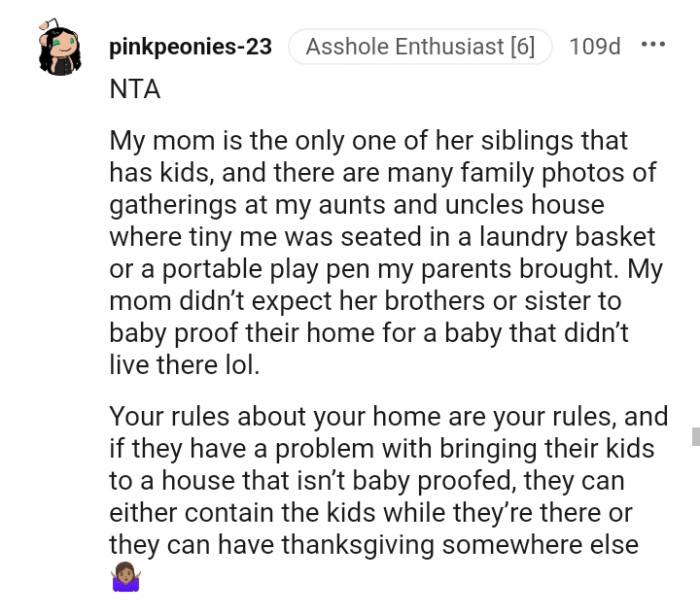
Understanding Different Perspectives
Understanding differing perspectives on family and children can foster empathy and reduce conflict. Dr. Laura Carstensen from Stanford University emphasizes that age and experience can shape how individuals view family structures and roles.
Recognizing these differences can enhance communication and promote a more harmonious family environment.
These are not stuffed animals that move

Don't host it as it's a bad idea

Don't let any of them near your parrots

Keeping your baby safe is a challenge from the minute he or she gets home! When staying several steps ahead is necessary, and your child's mobility is increasing, this becomes even more challenging.
The OP didn't need to childproof her house, as the reason they want her to host is the reason she doesn’t want to host. She received the "not the AH" verdict in the end.
Psychological Analysis
This situation highlights the conflicts that can arise between personal choices and familial expectations. The woman's refusal to childproof her home reflects a strong stance on her values, illustrating the importance of setting boundaries.
Encouraging open dialogue about these choices can lead to greater understanding and respect within family dynamics.
Analysis generated by AI
Analysis & Alternative Approaches
This scenario underscores the complexities involved in navigating familial expectations and personal choices. By fostering clear communication and practicing self-advocacy, individuals can cultivate healthier family dynamics that respect personal values.
Ultimately, embracing one’s choices and setting boundaries is essential for maintaining integrity and well-being in family relationships.
Analysis & Alternative Approaches
Understanding the psychological aspects of child-free choices can enhance family dynamics and personal well-being. Research supports the idea that establishing clear boundaries and fostering open communication are essential for maintaining healthy relationships, even amidst differing values.



